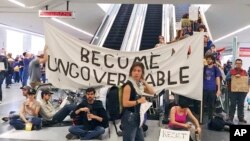After mostly holding its tongue after the U.S. election, the tech industry found its political voice as the country debated immigration and national security.
Silicon Valley's first major rift with the Trump administration may foreshadow future battles and signal tech's willingness to use social media to speak directly to customers about political issues.
But a more politically active tech industry also comes with risks. It could alienate customers who don't agree with its positions and hurt its relationship with the new administration that could also deliver long-sought changes Silicon Valley wants.
Still, even for an industry that has become more politically engaged and outspoken in recent years, the speed and sharpness of Silicon Valley's collective response to President Donald Trump's executive order temporarily restricting travel to the U.S. for some was surprising, observers said.
Many companies disagree with Trump
Companies put out statements decrying the action and offered services to those affected. Venture capitalists and Internet firms rallied to donate to civil rights groups helping refugees and other travelers who sought entry into the U.S. Sergey Brin, Google's co-founder, was at San Francisco International Airport over the weekend to take part in the demonstrations.
In many ways, the executive order ran smack into an issue that combines Silicon Valley's self-interest and its values of globalization.
“The tech industry is the natural rallying point for the global values that most of America espouses,” said Kirk O. Hanson, executive director of Santa Clara University's Markkula Center for Applied Ethics. “It's a self-interested battle because the industry is the most diverse by national origin compared to any industry in the U.S. and is a substantial user of temporary visas. This is an issue they are ready to address.”
Starbucks, Ford speak out against Trump
The tech industry was not alone in its response to the president's order, Starbucks and Ford, to name two firms, spoke out. But for the most part, other industry sectors and business groups have remained quiet.
In many ways, the tech industry's response was a culmination of a decade of increasing political engagement as it has slowly shed its disdain for politics. Its leaders met with President Barack Obama periodically, and some companies have spoken out about issues such as gay and transgender rights.
Since Trump won the presidency, Silicon Valley has sought ways to engage with a leader many had opposed.
Tech leaders such as Larry Page, the chief executive of Alphabet, the parent company of Google, went to Trump Tower in New York for a meeting with the then president-elect. Tesla CEO Elon Musk and Uber CEO Travis Kalanick joined the president's business advisory council.
But that friendlier approach shifted abruptly with the new administration's travel ban decision late last week.
Silicon Valley supports employees
The president's executive order ran smack into Silicon Valley's position that there are benefits to globalization and immigration. Many tech companies have founders that are foreign-born and have hired many foreign workers to fill jobs here. Most have overseas suppliers, and their international markets are bigger than their U.S. one.
“They realize that they have an obligation to their employees and their customers, to stand up for their values for what they think is right,” said Scott Gerber, a partner at Vrge, a technology communications firm. “It's been a unified response.”
What a new tech political engagement may mean in the coming weeks remains to be seen. The industry has said little about an issue close to its heart an expected executive order addressing the temporary work visa program, H-1B, which many companies use to bring in skilled foreign workers.
“I would not say overnight that tech has gone to a ‘Never Trump’ posture,” said one tech industry source, adding there are potential areas of cooperation between the industry and the new administration.





